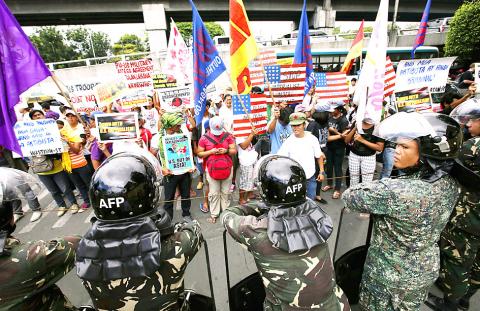Thousands of Philippine and US soldiers began annual war games yesterday, the first under a new security pact with the US, focusing on maritime security in the face of China’s growing naval presence in the disputed South China Sea.
The “Balikatan” (shoulder-to-shoulder) joint exercises would test the combat readiness of the two allies in this part of the world to respond to any maritime threats, including piracy and humanitarian assistance and disaster response.
The new security pact was signed last week just hours before US President Barack Obama visited.

Photo: EPA
Obama said the agreement was a testament to Washington’s “pivot” to Asia and was an “ironclad” commitment to defend the Philippines.
The Philippines has territorial disputes with China over the South China Sea, which is said to be rich in energy deposits and carries about US$5 billion in ship-borne trade every year.
The Spratly Islands (Nansha Islands, 南沙群島) in the South China Sea are also claimed by Taiwan, Brunei, Malaysia and Vietnam.
“Tensions in the Asia-Pacific region have increased due to excessive and expansive maritime and territorial claims, undermining the rule of law,” Philippine Foreign Affairs Secretary Albert del Rosario said at the opening ceremony at the main army base in Manila.
“The aggressive patterns of behavior aimed at changing the status quo threaten peace and stability in the region. Balikatan 2014, with its focus on maritime security, strongly supports our capabilities to address these challenges,” he said.
Asked about the exercises, Chinese Foreign Ministry spokeswoman Hua Chunying (華春瑩) said all sides needed to work “constructively” to maintain peace and stability in the Asia-Pacific region.
On Saturday, a Philippine Navy plane dropped food and water to troops stationed on a transport ship that ran aground on the disputed Second Thomas Shoal (Renai Shoal, 仁愛暗沙) in the South China Sea.
Chinese coast guard ships have set up a blockade around the shoal.
Nearly 5,500 US and Filipino troops are taking part in the two-week drills in different parts of the main island of Luzon.
The war games are to see US F-18 fighters rehearse bombing runs and troops involved in live fire drills.
Under a new security pact, the Enhanced Defense Cooperation Agreement, signed last week during Obama’s visit, the US is to have wider access to local bases and construct facilities to store supplies and equipment for 10 years in exchange for increased support on maritime security and humanitarian assistance.
The annual war games come under the 1951 Mutual Defense Treaty, part of a web of security alliances the US built in the Asia-Pacific region during the Cold War.
Dozens of leftwing activists protested outside the main army base in Manila, saying the Americans were using China as a bogeyman to gain a forward base in the Philippines.
“Our armed forces will not modernize just because we conduct war games with US forces,” left-wing group Bayan (Nation) Secretary-General Renato Reyes said.
“Our capacity to defend our territory against China will not be improved just because there are training exercises,” he added.

INVESTIGATION: The case is the latest instance of a DPP figure being implicated in an espionage network accused of allegedly leaking information to Chinese intelligence Democratic Progressive Party (DPP) member Ho Jen-chieh (何仁傑) was detained and held incommunicado yesterday on suspicion of spying for China during his tenure as assistant to then-minister of foreign affairs Joseph Wu (吳釗燮). The Taipei District Prosecutors’ Office said Ho was implicated during its investigation into alleged spying activities by former Presidential Office consultant Wu Shang-yu (吳尚雨). Prosecutors said there is reason to believe Ho breached the National Security Act (國家安全法) by leaking classified Ministry of Foreign Affairs information to Chinese intelligence. Following interrogation, prosecutors petitioned the Taipei District Court to detain Ho, citing concerns over potential collusion or tampering of evidence. The

‘FORM OF PROTEST’: The German Institute Taipei said it was ‘shocked’ to see Nazi symbolism used in connection with political aims as it condemned the incident Sung Chien-liang (宋建樑), who led efforts to recall Democratic Progressive Party (DPP) Legislator Lee Kun-cheng (李坤城), was released on bail of NT$80,000 yesterday amid an outcry over a Nazi armband he wore to questioning the night before. Sung arrived at the New Taipei City District Prosecutors’ Office for questioning in a recall petition forgery case on Tuesday night wearing a red armband bearing a swastika, carrying a copy of Adolf Hitler’s Mein Kampf and giving a Nazi salute. Sung left the building at 1:15am without the armband and apparently covering the book with a coat. This is a serious international scandal and Chinese

Seventy percent of middle and elementary schools now conduct English classes entirely in English, the Ministry of Education said, as it encourages schools nationwide to adopt this practice Minister of Education (MOE) Cheng Ying-yao (鄭英耀) is scheduled to present a report on the government’s bilingual education policy to the Legislative Yuan’s Education and Culture Committee today. The report would outline strategies aimed at expanding access to education, reducing regional disparities and improving talent cultivation. Implementation of bilingual education policies has varied across local governments, occasionally drawing public criticism. For example, some schools have required teachers of non-English subjects to pass English proficiency

TRADE: The premier pledged safeguards on ‘Made in Taiwan’ labeling, anti-dumping measures and stricter export controls to strengthen its position in trade talks Products labeled “made in Taiwan” must be genuinely made in Taiwan, Premier Cho Jung-tai (卓榮泰) said yesterday, vowing to enforce strict safeguards against “origin laundering” and initiate anti-dumping investigations to prevent China dumping its products in Taiwan. Cho made the remarks in a discussion session with representatives from industries in Kaohsiung. In response to the US government’s recent announcement of “reciprocal” tariffs on its trading partners, President William Lai (賴清德) and Cho last week began a series of consultations with industry leaders nationwide to gather feedback and address concerns. Taiwanese and US officials held a videoconference on Friday evening to discuss the